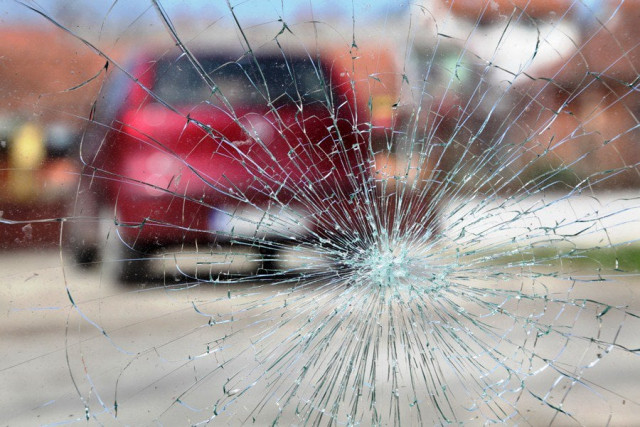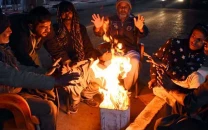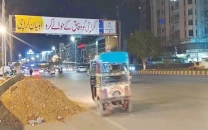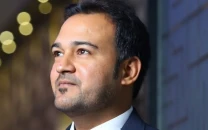Pakistan’s only research centre for road accidents shuts down
It was set up in 2004 after a sudden surge in head injuries owing to road accidents

The road investigation officer of the centre, Irfan Saleem, shared that over 3,000 road accidents have been investigated by him. PHOTO: EXPRESS
The centre came into being on August 1, 2006, in the two rooms of JPMC’s Neurosurgery Ward II.
Surge in head injuries
It was the regime of General (retd) Pervez Musharraf and Shaukat Aziz was the prime minister when several bank reforms were introduced that allowed car and motorcycle finance loans. As a result, there was an explosion of vehicles on roads.
Fatal collision: Seven children killed as truck hits school van
It was then that neurosurgeon and former Health Director-General Dr Rashid Jooma found a sudden surge in head injuries due to road accidents. In 2004, Dr Jooma started collecting information of patients with head injuries from JPMC, Abbasi Shaheed Hospital, Civil Hospital, Karachi, Liaquat National Hospital and Agha Khan University Hospital (AKUH). "We collected good information [on] how pedestrians started [being] killed after getting hit by a car or motorcycle," he said. “… how dresses of ladies get stuck in motorcycle wheels and chain, which leads to severe road accidents.”
After that, he went to the then elected mayor of the city, Mustafa Kamal, and then Sindh governor Dr Ishratul Ebad Khan, who expressed interest in their data and facilitated them to form a research centre.
Structure
In the team, there was a combination of engineers – most of them from NED University – experts from public health and people from policing background. All of them were working pro bono.
Fatal mishaps: Three killed in road accidents
The team trained and deployed people in surveillance of road accidents.
No one to finance
Initially, the centre was funded through road-related companies and a few donors. As time passed, the bureaucratic local government came into being in 2013 that took little interest in the centre. Resultantly, the funds also halted. For two years, Dr Jooma ran the centre out of his own pocket and spent around Rs3 million to keep it going. "We went to the Sindh government's planning and development department and offered them to install the traffic injury and surveillance system in the entire province," said Dr Jooma. He added his team was even ready to form a PC-1 for the project. "They (Sindh government) showed no interest."
Indian TV anchor reads out news of her husband's death in accident
According to the head of the urban and infrastructure department of NED University, Dr Mir Shabbar Ali, nobody in the Sindh government thinks that this centre is of any worth. Dr Ali along with Dr Jooma has highlighted several accident-prone spots of the city before the government through the research of this centre. Even the Citizens-Police Liaison Committee (CPLC) refused to fund the centre, he said.
Achievements
According to Dr Ali, road safety audit of around 200 locations were conducted by the centre. Out of those, the Sindh government implemented their suggestions on 20% of the locations, after which the accidents’ ratio declined manifold at certain locations. For example, on the recommendation of the centre, road strips were installed on the Baloch Colony Expressway after it experienced major accidents almost every week. Also, skid resistance was installed at the KPT Bridge.
Roads in Pakistan remain dangerous for pedestrians
The road investigation officer of the centre, Irfan Saleem, shared that over 3,000 road accidents have been investigated by him. Saleem used to examine the movement of heavy vehicles and motorcycles at accident-prone locations and what factors cause accidents at these locations. After that, he said, low-cost solutions would be provided to the government.
According to Saleem, the need of the centre can be gauged from the fact that according to Karachi traffic police's data, the city experiences only 600 deaths a year. "Whereas our data from only five hospitals shows that 1,200 people die due to road accidents every year," he said.
Whose job is it?
According to Dr Ali, in USA, the city government is responsible for collecting data of road accidents not the traffic police as they are law enforcers and won't be able to collect data impartially.
Four killed, 25 injured in collision in Jamshoro district
This is actually the job of the Traffic Engineering Bureau (TEB) under Karachi Development Authority (KDA), which is not doing it properly, said Dr Ali. Meanwhile, TEB’s director, Qazi Abdul Qadir, was not available for comment despite repeated attempts.
When asked about the 10-year research data of the centre, Dr Jooma said that people in the city government might have that or it could be in the computers of JPMC. He, however, agreed that it is less easy now for new researchers to obtain data.



















COMMENTS
Comments are moderated and generally will be posted if they are on-topic and not abusive.
For more information, please see our Comments FAQ